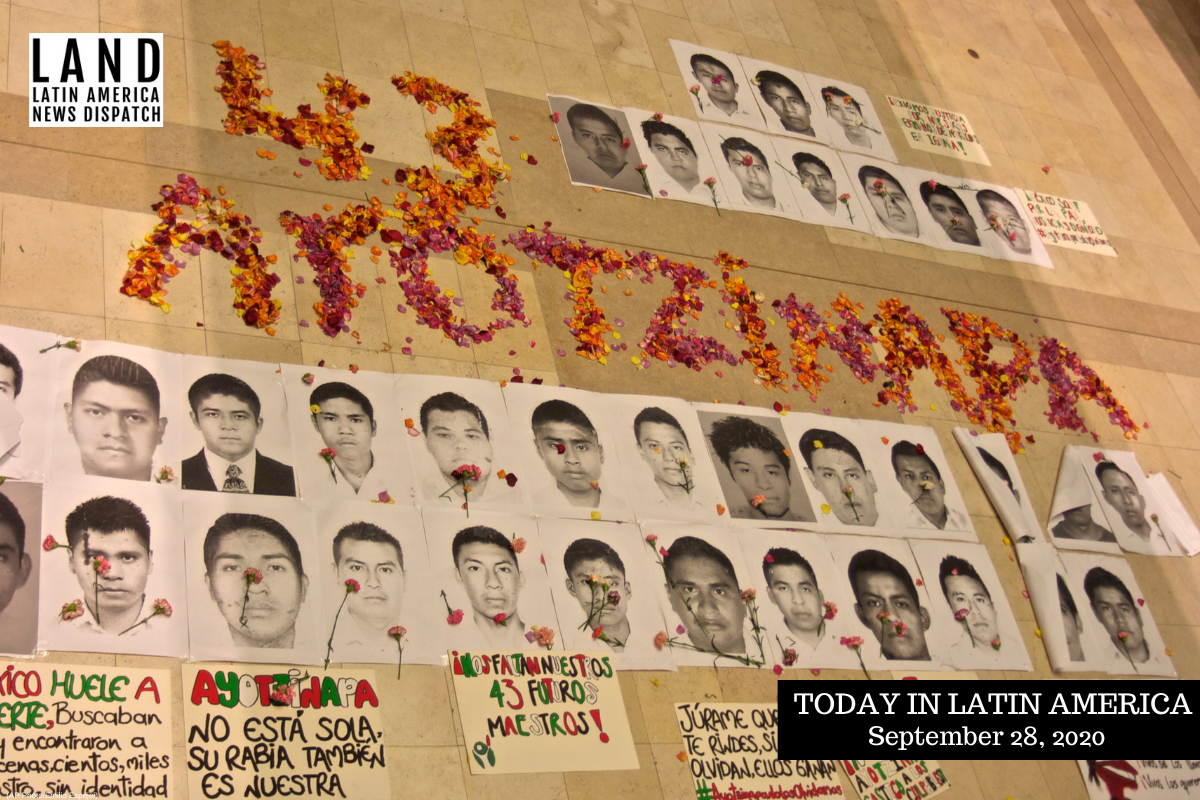MEXICO: Thousands marched in cities across Mexico on Saturday to mark the sixth anniversary of the 2014 disappearance of 43 students from the Ayotzinapa Teachers College in the state of Guerrero. The protests occurred as Mexico’s Attorney General Alejandro Gertz Manero issued arrest warrants for at least 70 individuals suspected of participating in the disappearances and the subsequent cover up. Those facing arrest include members of the Mexican Army, some of whom are accused of receiving bribes from the Guerreros Unidos drug cartel, as well as Federal Police officers and other federal officials.
In an event with the families of the students on Saturday, Gertz Manero accused high-level officials in the previous administration, including former Attorney General Jesús Murillo Karam and the head of the then-federal investigation agency Tomás Zerón, of orchestrating a cover-up. Zerón has been on the lam since the summer, when a warrant for his arrest was issued over allegations of torture and involvement in forced disappearances.
HEADLINES FROM THE WESTERN HEMISPHERE
SOUTHERN CONE
REGIONAL: Six months since the arrival of COVID-19 in the region, Latin American countries are crossing dire milestones. Three of the world’s 15 most affected countries are in the Southern Cone: Argentina, Brazil, and Chile. Argentina surpassed 700,000 confirmed cases on Saturday with over 15,000 deaths. Brazil, meanwhile, continues to have the second highest death toll in the world just after the United States. As a result, Rio de Janeiro’s Carnival parade, previously scheduled to occur in February, was postponed indefinitely for the first time in a century. And in an effort to combat rising unemployment in Chile, President Sebastián Piñera announced on Sunday a stimulus package of $2 billion in subsidies aimed at creating one million jobs.
THE ANDES
COLOMBIA: A Colombian soldier on Thursday shot and killed a transgender woman, Juliana Giraldo, at a military checkpoint in the southwestern Cauca province. According to her husband’s account of the events, soldiers shot at the couple when they attempted to turn around at the military checkpoint after having realized that they had forgotten their vehicle paperwork at home. President Iván Duque and Minister of Defense Carlos Holmes Trujillo condemned the killing and called for a quick investigation, while the army general in charge of the division at the Cauca checkpoint said in a radio interview on Friday that the soldiers shot at the vehicle’s tires to stop it. The general added that a bullet “fell to the pavement and changed course,” striking Giraldo in the head. Protests erupted in various cities in response.
THE CARIBBEAN
PUERTO RICO: In an attempt to avoid paying at least $1.27 billion from three federal programs to Puerto Rico, the U.S. Department of Justice has submitted a motion to a federal court on the island, asking for all processes in the case to come to a halt until their appeal is heard. In August, U.S. District Judge William G. Young ruled that it is “unconstitutional” to deny Puerto Ricans access to social welfare programs. Young wrote in his August decision that “to be blunt, the federal government discriminates against Americans who live in Puerto Rico.” The U.S. government appealed that decision on September 11, arguing that providing Supplemental Security Income (SSI), Supplemental Nutrition Assistance (SNAP), and Medicare Part D Low-Income Subsidy to Puerto Ricans is too costly. Experts believe that it is likely the U.S. government could appeal the case all the way to the U.S. Supreme Court.
CUBA/UNITED STATES: Two men charged with kidnapping and torturing Cuban migrants made their first court appearance last week in Miami federal court. Reynaldo Marquez Crespo, 41, and Jancer Sergio Ramos Valdes, 33 are charged with involvement in a smuggling ring that promised to bring would-be Cuban migrants to the United States by boat. Instead, Crespo, Valdes and others held the Cuban nationals captive at a home in Mérida, Mexico, where the U.S. Attorney’s Office alleges their family members were asked for $10,000 in ransom. Migrants whose families were able to pay the ransom were bussed to the United States-Mexico border and told to request political asylum. Migrants whose families could not pay were tortured and threatened with death.
CENTRAL AMERICA
EL SALVADOR: President Nayib Bukele named Milena Mayorga, better known as a television host in El Salvador, as the country’s ambassador to the United States. Mayorga was a top 10 finalist in the 1996 Miss Universe pageant, when President Donald Trump owned the pageant. Elected to the Salvadoran Congress in 2018 as a member of the conservative ARENA party, Mayorga later denounced corruption in the party, and eventually left it in June of this year. In 2018, Mayorga tweeted a controversial tribute to Colonel Domingo Monterrosa, the military leader accused of leading the 1981 massacre at El Mozote, celebrating the anniversary of his birth.
NORTH AMERICA
MEXICO/UNITED STATES: Farmers in Chihuahua have continued to occupy the La Boquilla dam on the Conchos River, preventing the delivery of water to Texas as stipulated by a 1944 treaty between the United States and Mexico. The treaty requires Mexico to deliver water to the United States through the Rio Grande while the United States delivers water from the Colorado River to Mexico. Mexico has fallen behind on its obligations over the past few years, and must deposit 307,000 acre-feet of water––nearly a year’s worth––into the Rio Grande by October 24. But the farmers occupying the dam say losing that much water would be a huge blow to agriculture in the area, especially considering that the region is going through a drought. Earlier this month, two farmers were killed during protests over the deal. President Andrés Manuel López Obrador, for this part, called on the farmers to allow the Mexican government to pay its debt to the United States, saying “we do not want this to become a campaign issue” in reference to the U.S. 2020 elections.
***



